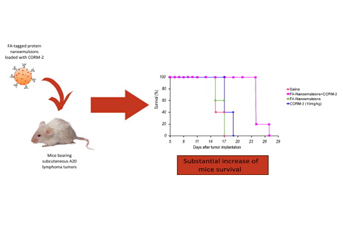Associação Portuguesa de Investigação em Cancro
Folate tagged nano emulsions with CORM-2 enhance the survival of mice with lymphoma tumors
Folate tagged nano emulsions with CORM-2 enhance the survival of mice with lymphoma tumors

Authors and Affiliations:
Ana Loureiro a,b, Gonçalo J.L. Bernardes c,d, Ulyana Shimanovich c, Marisa P. Sárria a,b, Eugénia Nogueira a,b, Ana Preto b, Andreia C. Gomes b, Artur Cavaco-Paulo a
a CEB–Centre of Biological Engineering, Department of Biological Engineering, University of Minho, Campus de Gualtar, Braga, Portugal
b CBMA–Centre of Molecular and Environmental Biology, Department of Biology, University of Minho, Campus of Gualtar, Braga, Portugal
c Department of Chemistry, University of Cambridge, Lensfield Road, Cambridge, United Kingdom
d Instituto de Medicina Molecular, Faculdade de Medicina da Universidade de Lisboa, Lisboa, Portugal
Abstract:
Folic Acid (FA)-tagged protein nanoemulsions were found to be preferentially internalized on B-cell lymphoma cell line (A20 cell line), which, for the first time, are reported to express folate receptor (FR)-alpha. Carbon monoxide releasing molecule-2 (CORM-2) was incorporated in the oil phase of the initial formulation. FA-functionalized nanoemulsions loaded with CORM-2 exhibited a considerable antitumor effect and an increased survival of BALB/c mice bearing subcutaneous A20 lymphoma tumors. The developed nanoemulsions also demonstrated to be well tolerated by these immunocompetent mice. Thus, the results obtained in this study demonstrate that FA-tagged protein nanoemulsions can be successfully used in cancer therapy, with the important ability to delivery drugs intracellularly.
Journal: Nanomedicine: Nanotechnology, Biology and Medicine
Link: http://www.sciencedirect.com/science/article/pii/S1549963415000726




